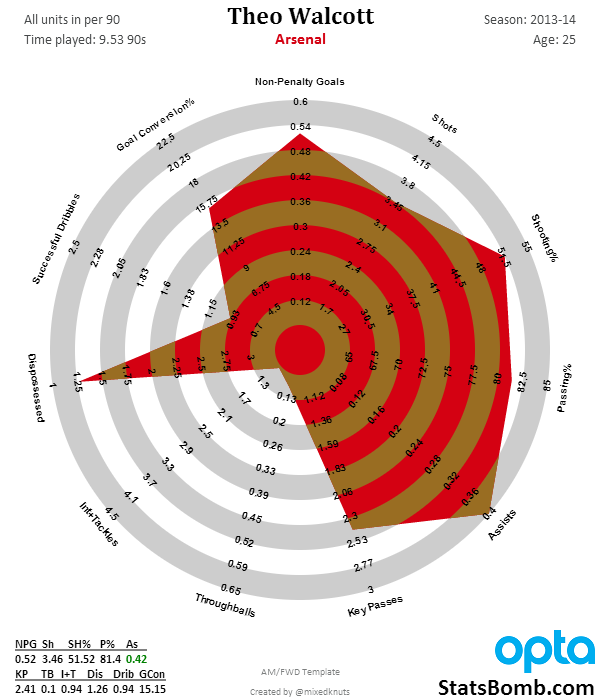Towards the end of last season, when it looked like Theo Walcott was being phased out of Arsenal’s plans and heading towards the exit door, I almost wrote a piece on what I considered a sad demise. In the previous few years I’d grown increasingly fond of the skills Walcott could offer and it was disappointing to see him go from key player to bit part option after missing the best part of a year through injury. Before I could write it, however, Walcott hit a hat-trick against West Brom, scored in the FA Cup final, signed a new contract and seemed to be reigniting his Arsenal career.
There’s no denying what has happened since has been incredibly disappointing. Walcott hasn’t delivered the goals it was hoped he would and the fears about what he would contribute in general play have been proved true. While at times in the early parts of the season he was good as the number nine, his finishing let him down and when played in wide areas this season he’s harmed the team more often than he’s helped it. The growing discontent among Arsenal fans with his performances reached a new nadir in Sunday’s pitiful loss at Old Trafford. Walcott was diabolic. He made almost no contribution on the ball, and what he did do was at best ineffective, and at worst detrimental; the first United goal coming after he lost the ball in his own half.
Twitter vented with calls for him to be sold as soon as possible, preferably to a level more suited to his abilities, lower down the English divisions or maybe to MLS or China. Not only was his technical ability league one level, he was also, not for the first time, hiding or not trying. Amy Lawrence, not in a particularly malicious way it’s worth clarifying, questioned whether fear of failure was to blame for his disappearing act. Gunnerblog was a little more direct and called him a “fraudulent footballer”. When his name was read out among the substitutes on Wednesday night at home to Swansea, some sections of the home crowd booed to show their dissatisfaction.
But rather than simply berate Walcott for his performances, it’s worth asking why they’ve been as bad as they are. At this point, some will argue that Walcott is simply not very good, but it ignores the fact that he has been a very effective player for Arsenal in the past. In 2012/13, the closest he has had to a full season in the last four years, he started 24 premier league games, scored 14 goals and made 10 assists. 13/14 and 14/15 were almost complete write-offs because of injury, but he still directly contributed to 0.97 goals per 90 minutes over those two seasons. He scored three hat-tricks in those seasons, more than every other forward in the squad has in their Arsenal careers combined.
But one of the criticisms of Walcott is that he’s not someone who helps at all in general play and is purely an end product player. While Theo is never a player who is going to have a high amount of touches he is someone who knows his role and can contribute in pushing the defensive line deeper and creating space. His passing accuracy is high for a forward and he rarely losses it at his feet meaning attacks don’t break down regularly because of him. How someone helps to create space is pretty hard to be objectify, but a German statistical model named Goalimpact is a popular attempt at doing so.

Via @mixedknuts
Goalimpact (GI) quantifies the goal difference a side accumulates when a player is playing compared to when he isn’t. It’s different to other player rating systems which try to quantify what a player does on the ball in terms of goalscoring, passing etc. Good players have a GI over 100 and those generally considered world class have one up and above 150. It ranks the current two best players in the world as Müller and Özil, two players well known for being intelligent users of space, whose qualities aren’t always obvious but generally always help their team get results. Walcott features in the top 10 and is on similar ground to Messi by GI. This is not to say that Walcott is as good as Messi (obviously) but simply that Arsenal do much better when he is in the team compared to without. Obviously these things require more context; maybe Walcott played easier games and missed tougher fixtures, maybe he came on in preferable game states. But over what is a large sample, we can take his GI rating for its worth and note that over the years Arsenal have done much better when Walcott has played.
All of which raises the question, why has Walcott had such a poor season? One of the earlier frustrations was his finishing when playing as a striker in the early part of the season when Arsenal were functioning well and creating lots of chances. In this case, there is a lot of randomness and variance at play. Walcott has generally been a good finisher in his career and a few months is a tiny sample when it comes to converting chances. In another season Walcott would’ve scored a lot more in the early period.
All scorers bar Messi are inconsistent, but Walcott rates as a solidly above average finisher over the last six years.
— Michael Caley (@MC_of_A) September 12, 2015
Not even Theo’s biggest fans would try to argue that he’s a great option to have on the left, where he played a lot post injury in December and January. The game at Old Trafford was his first start as a centre forward in the league since mid October. In the FA Cup fixture against Hull he had good moments and a solid game overall.
Arsenal have also been something of a dysfunctional mess recently. It’s likely not a coincidence that all of the other forwards at the club are having some of their worst scoring droughts ever. Even both of Welbeck’s goals since his comeback from injury have come from set pieces. Arsenal are struggling to control games and build play from the back through the middle. Where once Walcott was surrounded by technical midfielders such as Fabregas, Hleb, Rosicky, Arteta, Wilshere and Cazorla he’s now playing with a Ramsey-Coquelin central midfield who, for all their quality, are a step lower when it comes to on the ball quality. Arsenal simply aren’t creating many good open play chances in 2016, and they’re not controlling territory either. For someone who relies on keeping it simple in the final third and letting the more technical players operate, it becomes very hard to perform.
The problem for Walcott comes with his seniority, and subsequently his wage. He likely remains an asset in a team with a well functioning midfield when he’s playing in his preferred role. But when he’s taking home £140k from the club every week, the same as Mesut Özil, the fact that the current setup doesn’t work for him is not an excuse fans want to hear. When Walcott signed a new deal in 2012/13 he was a massive player who Arsenal simply had to keep. The song was a very different one last summer and Walcott and his agent simply didn’t have the same bargaining power again. They probably shouldn’t have been able to get such a high wage and it arguably shows a flaw in Wenger’s loyalty and democratic wage structure. Walcott has been at the club for 10 years and has built up an increasingly high salary, one that is now above that of his contribution to the team.
It makes it a very difficult situation for the club. When he’s on that money it’s hard to justify keeping him on the grounds that he’s a useful option to have and will be very good on the right day, especially as just what the right day is seems to have narrowed in definition. A club such as Arsenal can’t really afford a £140k a week squad player, which means Walcott will probably be playing for his Arsenal career in these last two and a half months. And maybe him moving on is best for both parties. But maybe, just maybe, Walcott isn’t a coward and a championship level footballer, and is instead simply a player not suited to what he’s being asked to do by a malfunctioning team.
Oscar Wood
Latest posts by Oscar Wood (see all)
- So this is what Arsenal getting the best out of Aaron Ramsey looks like - December 9, 2017
- Why Arsenal Should Attempt to Break the Bank on Mateo Kovacic - July 28, 2017
- Why Arsenal must give Xhaka and Ramsey a run of games in the midfield - November 25, 2016
